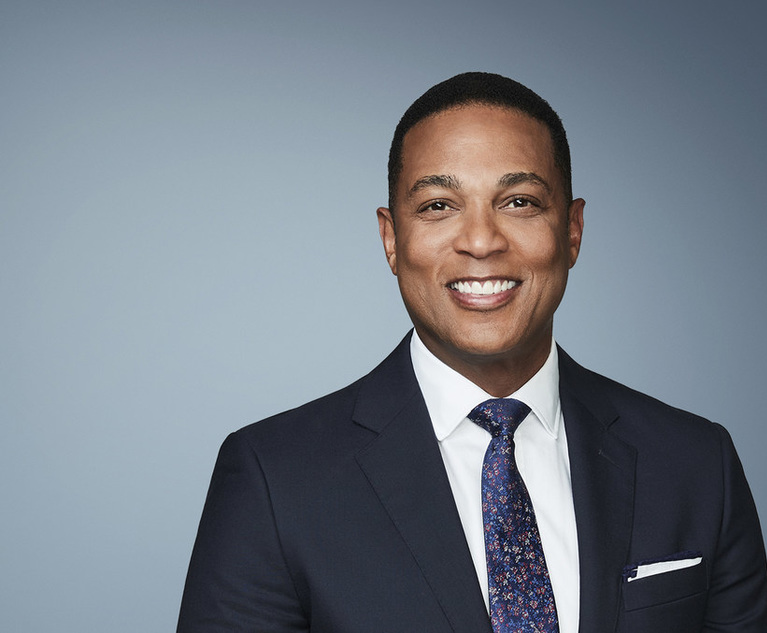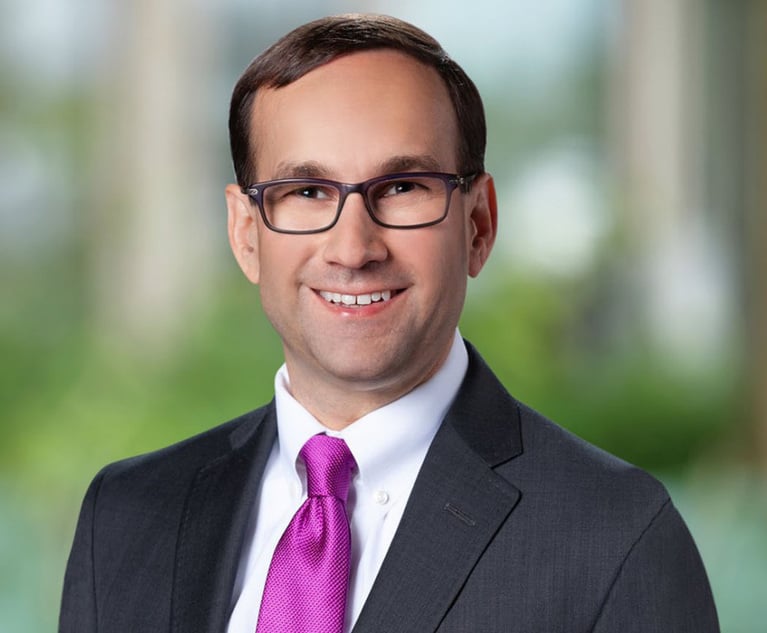CNN's Lemon Says DEI Requires Getting Out of 'Comfort Zone'
"You have to broaden your horizons. And it has to start in your personal life," Lemon said at General Counsel Conference East in New York.
September 21, 2022 at 12:00 PM
5 minute read
 CNN anchor Don Lemon. Courtesy photo
CNN anchor Don Lemon. Courtesy photo
Award-winning CNN anchor Don Lemon said organizations that want to improve diversity, equity and inclusion must look around their offices.
"If everyone looks like you, you're not doing it right," he said
Lemon, who soon will wrap up "Don Lemon Tonight" on CNN to cohost a new morning show on the network, was the keynote speaker Tuesday on the second and final day of ALM Global's General Counsel Conference East in New York City. The session was hosted by Heather Nevitt, editor-in-chief of Corporate Counsel and Global Leaders in Law.
Lemon recently wrote the book "This Is the Fire: What I Say to My Friends About Racism," in which he talks about systemic racism in America. He said that as a Black American he has had to deal with issues all Americans face, so for him this book is "the American story."
"I did not grow up with a silver spoon in my mouth. I grew up being a Black kid in Louisiana in the Deep South who was hiding the secret that I was gay. I've dealt with that issue forever," he said.
"I remember being in college, and my journalism teacher telling me that I wasn't going to make it as a journalist. And that I should do something that was better-suited for my talents. And I thought I was very talented as a journalist. But when he said that to me, I knew what he meant," Lemon said.
Lemon said his passion for writing the book was fueled by his desire to help people who are like him realize that they can do whatever they want regardless of what skin they're in.
In the wake of George Floyd's killing, Lemon said he realized how divided the country was and knew something had to be done. The case inspired Lemon to write the book in four months.
"I was sitting in my home … in my office, and George Floyd happened. I was the only person there because we were in the middle of a pandemic. I saw the video and I started yelling at the TV [to] stop and I closed my office door and I just started crying. And as it unfolded, I became the face of that," he said.
He questioned himself: "How would I write a book to reach as many people as possible? And what would it be called?" He decided on "How I Would Talk to My Friends About Racism."
"It's not accusatory. It's not divisive. It's a very unifying book. It holds people into account."
He said that's the approach corporations will have to take.
"You'll always have to [approach] these matters—no matter if it's in a professional environment or personal environment—by not being accusatory, being curious instead of judgmental. So if you have a question, you should ask those questions," Lemon said.
He added that business leaders will have to look around their organization and see if it is diverse, "meaning not only people of color, also women and people who are from different backgrounds."
He said people usually hire people who look like them, are in their social circles or they are comfortable with.
"We have to get out of that comfort zone and and take a really hard look at ourselves and our organization and be truthful about what's happening," he said.
When he has those conversations with his bosses and colleagues, sometimes they're very uncomfortable and "I'm sure people would like to go to HR about it. But at the end of the day, I'm not accusing anyone. I'm just trying to enlighten people," he said.
Lemon said employees will have to be confident and bold enough to approach their bosses. In turn, bosses should review their organizational charts and see who their reports are and if it's a diverse group.
"You have to broaden your horizons. And it has to start in your personal life. If it starts in your personal life … it will make you more comfortable in your professional life.
"And if you're an employee, you have to be able to be bold enough to hold up a mirror to your boss. It's uncomfortable, but I do it, and many times they learn from it."
Lemon and Nevitt agreed that diversity makes for a more interesting organization, as well as one that's more innovative.
"It's not just that we want to visually see a more diverse group. It's great for business," Nevitt said.
Lemon agreed: "Who doesn't want more people in the tent? What business doesn't want more customers? The more people that you can draw into your business, the more successful you're going to be, the more money you're going to make and the more people's lives you're going to affect, including your own people."
"You will become wealthier and stronger and bigger, because you're more diverse."
This content has been archived. It is available through our partners, LexisNexis® and Bloomberg Law.
To view this content, please continue to their sites.
Not a Lexis Subscriber?
Subscribe Now
Not a Bloomberg Law Subscriber?
Subscribe Now
NOT FOR REPRINT
© 2025 ALM Global, LLC, All Rights Reserved. Request academic re-use from www.copyright.com. All other uses, submit a request to [email protected]. For more information visit Asset & Logo Licensing.
You Might Like
View All

How Qualcomm’s General Counsel Is Championing Diversity in Innovation
6 minute read
People and Purpose: AbbVie's GC on Leading With Impact and Inspiring Change
7 minute readTrending Stories
- 1'It's Not Going to Be Pretty': PayPal, Capital One Face Novel Class Actions Over 'Poaching' Commissions Owed Influencers
- 211th Circuit Rejects Trump's Emergency Request as DOJ Prepares to Release Special Counsel's Final Report
- 3Supreme Court Takes Up Challenge to ACA Task Force
- 4'Tragedy of Unspeakable Proportions:' Could Edison, DWP, Face Lawsuits Over LA Wildfires?
- 5Meta Pulls Plug on DEI Programs
Who Got The Work
Michael G. Bongiorno, Andrew Scott Dulberg and Elizabeth E. Driscoll from Wilmer Cutler Pickering Hale and Dorr have stepped in to represent Symbotic Inc., an A.I.-enabled technology platform that focuses on increasing supply chain efficiency, and other defendants in a pending shareholder derivative lawsuit. The case, filed Oct. 2 in Massachusetts District Court by the Brown Law Firm on behalf of Stephen Austen, accuses certain officers and directors of misleading investors in regard to Symbotic's potential for margin growth by failing to disclose that the company was not equipped to timely deploy its systems or manage expenses through project delays. The case, assigned to U.S. District Judge Nathaniel M. Gorton, is 1:24-cv-12522, Austen v. Cohen et al.
Who Got The Work
Edmund Polubinski and Marie Killmond of Davis Polk & Wardwell have entered appearances for data platform software development company MongoDB and other defendants in a pending shareholder derivative lawsuit. The action, filed Oct. 7 in New York Southern District Court by the Brown Law Firm, accuses the company's directors and/or officers of falsely expressing confidence in the company’s restructuring of its sales incentive plan and downplaying the severity of decreases in its upfront commitments. The case is 1:24-cv-07594, Roy v. Ittycheria et al.
Who Got The Work
Amy O. Bruchs and Kurt F. Ellison of Michael Best & Friedrich have entered appearances for Epic Systems Corp. in a pending employment discrimination lawsuit. The suit was filed Sept. 7 in Wisconsin Western District Court by Levine Eisberner LLC and Siri & Glimstad on behalf of a project manager who claims that he was wrongfully terminated after applying for a religious exemption to the defendant's COVID-19 vaccine mandate. The case, assigned to U.S. Magistrate Judge Anita Marie Boor, is 3:24-cv-00630, Secker, Nathan v. Epic Systems Corporation.
Who Got The Work
David X. Sullivan, Thomas J. Finn and Gregory A. Hall from McCarter & English have entered appearances for Sunrun Installation Services in a pending civil rights lawsuit. The complaint was filed Sept. 4 in Connecticut District Court by attorney Robert M. Berke on behalf of former employee George Edward Steins, who was arrested and charged with employing an unregistered home improvement salesperson. The complaint alleges that had Sunrun informed the Connecticut Department of Consumer Protection that the plaintiff's employment had ended in 2017 and that he no longer held Sunrun's home improvement contractor license, he would not have been hit with charges, which were dismissed in May 2024. The case, assigned to U.S. District Judge Jeffrey A. Meyer, is 3:24-cv-01423, Steins v. Sunrun, Inc. et al.
Who Got The Work
Greenberg Traurig shareholder Joshua L. Raskin has entered an appearance for boohoo.com UK Ltd. in a pending patent infringement lawsuit. The suit, filed Sept. 3 in Texas Eastern District Court by Rozier Hardt McDonough on behalf of Alto Dynamics, asserts five patents related to an online shopping platform. The case, assigned to U.S. District Judge Rodney Gilstrap, is 2:24-cv-00719, Alto Dynamics, LLC v. boohoo.com UK Limited.
Featured Firms
Law Offices of Gary Martin Hays & Associates, P.C.
(470) 294-1674
Law Offices of Mark E. Salomone
(857) 444-6468
Smith & Hassler
(713) 739-1250







